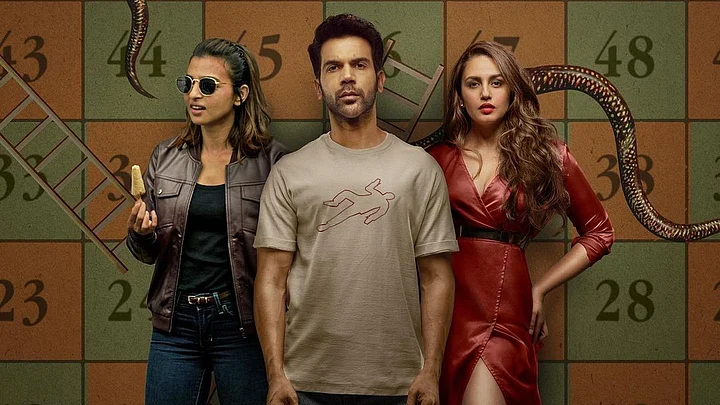(This article contains major spoilers.)
Netflix’s Monica, O My Darling takes you on a hilariously eccentric ride. Shouldered by a host of excellent actors, Huma Qureshi and Radhika Apte, to name a few, the story never fails to engage the audience. But despite the inherent whimsical nature of the film, its identity is shaped by its not-so-subtle and doubly quirky soundtrack.
The story of the film revolves around Jayant (Rajkummar Rao) as he attempts to climb the social ladder. Unfortunately, he finds himself in a precarious position when Monica (Huma Qureshi), the woman he is having an affair with, reveals that she is pregnant. And for Jayant, everything goes downhill from there. A police procedural, several murders and an unlikely love story follow.
The music is composed by Achint Thakkar, who fabulously condenses elements of suspense and humour, in the songs, especially when placed together with the visuals.
So as the story progresses, it’s glaringly obvious the real star of the film is the seemingly retro soundtrack that reveals more about the plot than the plot itself – as if teasing us with the clues of who the culprit might be. The film opens with the song ‘Ye Ek Zindagi’ already reeling the audience in with the neo-noir element which is the overarching tonality of the film.
The lyrics,'Ye Ek Zindagi Kaafi Nhi Hai', centre on the figure of Monica, as she sways around her spectators – reinstating herself as femme fatale.
But with the progress of the film, it is Piya Tu Abb to Aaja that reverberates as the titular character attempts to dupe men of their money, and she self admittedly has no remorse for it. The ethics of it are beside the point, it’s the grace with which she carries herself, as ‘Monica Abb Toh Aaja’ plays in the background, that stays with us. The song is driving the fact home that she is in a dicey position but she will still enjoy the ride.
Another song that stands out is in the scene of Nishikant’s funeral. ‘Bye Bye Adios’ plays immediately after Vijayashanti Naidu (Radhika Apte) threatens Jayant and leaves. There are multiple layers to this sequence, one is the looming threat of being behind bars, and the other is the knowledge that a killer is on the loose. But, it’s the comic relief the song provides, with a frazzled Jayant that makes the scene entertaining.
Although it's the scene in which ‘Farsh Pe Khade’ plays that takes the cake. The scene is exceptionally well shot - with every beat drop, you see the camera shift its gaze. The scene creates a conflation of humour and suspense. You don’t want Jayant to be caught, yet it’s difficult to not laugh at his predicament. Especially when you know the first two lines of the song, ‘Dil hai chota sa magar, kwaab hai bade’ (Your heart is very small, but your dreams are big), hold very true for him.
It’s the absurdity of something ridiculous happening with a deliberately old-school-sounding OST that adds to the entertainment quotient.
Dark comedies are a hot favourite for Bollywood these days. But none of those films, Darlings nor Good Luck Jerry, managed to use the background score quite so efficiently. And perhaps with good reason, considering the subject matter was vastly different, a tad bit more serious.
Yet, it should be noted, that in Monica O My Darling we relish in the dark aspects of the film, the hero is for the most part selfish, the other characters are also agenda driven. So we don't squirm when they are faced with a predicament we rejoice, simultaneously wanting them to overcome it, but doing so in-between giggles. Which says more about the director Vasan Bala's vision, than anything else.
(At The Quint, we question everything. Play an active role in shaping our journalism by becoming a member today.)
